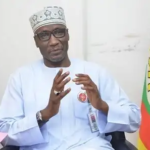The Comptroller General of the Nigeria Customs Service (NCS), Mr Bashir Adeniyi, has raised concerns that the proposed Tax reform bills are in jurisdictional conflict with the NCS and will, consequently, legislate the agency out of existence.
Adeniyi raised this concern at the ongoing public hearing on the tax reform bills organised by the House of Representatives Committee on Finance, on Wednesday, February 26.
Presenting key objections contained in a 17-page memorandum before the committee, the Customs boss expressed fears that the bills might override existing laws, including the Nigeria Customs Service Act, 2023.
Adeniyi emphatically pointed to Section 1 of the Nigerian Revenue Service Establishment Bill 2024, which provides a legal framework for the administration of taxes and revenue under any law, where section 42 defines tax to include any duty and revenue accruable to the government
He observed that this particular section subsumes everything that is provided under section 3 and 4 of the Nigeria Customs Act 2023.
He also highlighted that Sections 23, 29 and Section 41 of the Joint Revenue Bill have jurisdictional conflict issues.
“Basically, these are jurisdictional conflict issues. In the Nigerian Revenue Service Established Bill, Section 1 seeks to completely legislate Nigerian Customs Service out of existence, if you pardon my words”, he stated.
He further disclosed that Section 4 of the Revenue Service Bill provides another omnibus provision, as it gives the proposed NRS oversight functions over all taxes and levies, expressing worries that this new law is seeking to override all previous laws that were done to address issues regarding the economy.
Adeniyi therefore recommended that other agencies or proposed agencies should be made to work collaboratively with the Customs and not seek to abolish it.
“The principal recommendation we made was that we should encourage collaboration, integration of operations between customs and the tax authority, not to abolish customs, or not to repeal the law, because we want to do another law,” he said.



























